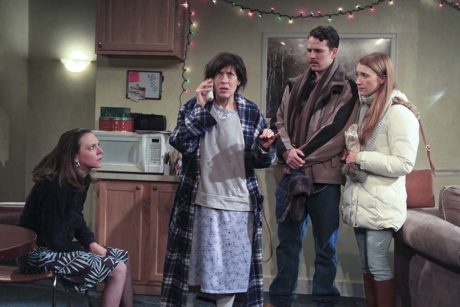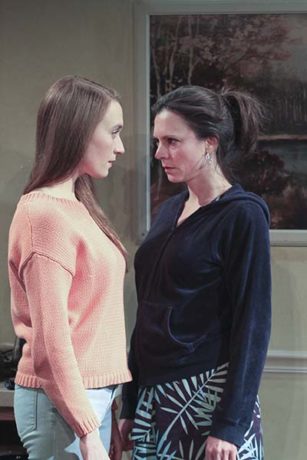For Maggie, life has been, ever since childhood, one crisis after another. Now, as a winter storm is blanketing her New Hampshire hometown, several more crises have struck at once: her car has been stolen; her rebellious 16-year-old daughter Erica has fled town – with that car; and without that car, and without any way of getting to work, Maggie will probably get fired – which could throw her whole family out on the street. Divorced, in her thirties, and living with her unemployed, 50-something mother, she’s still just scraping by: “I’m a pizza and a six-pack away from bouncing the fucking electric bill.”
In John Pollono’s play Lost Girls, Maggie may not have all the money she needs, but she certainly has a wisecrack and an insult for every occasion. Once her ex-husband Lou shows up to help with the search for Erica, Maggie’s every word and expression drips with contempt. Lou has given up the drinking which destroyed his marriage, and he’s moved from being a city cop to a more secure job as a state trooper. He’s even traded up to a younger wife, a demure, delicate type who has none of Maggie’s anger and sourness.

Maggie can’t forgive Lou for the horrible things he did during their marriage – but she also can’t forgive him for reforming his life and moving on. “You and me, Penny, ain’t ever gonna be friends,” she sneers at the new wife. But if Maggie is ever going to improve her life and her family’s, she’s going to have to learn to deal with every disappointment with something other than bile. And perhaps Penny – who turns out to be a lot wiser than Maggie first judges her to be – might help her figure out how to do that.
Lost Girls emphasizes comedy during its early scenes, with Maggie and her mother Linda spewing out some cutting, foul-mouthed one-liners. But the balance between comedy and drama is a shaky one, made more precarious by some mechanical plot contrivances and repetitive speeches about the characters’ backgrounds. And the truces and epiphanies that Pollono’s characters reach aren’t always convincing, especially in a final scene that wraps things up too conveniently.
Still, if the play’s construction is a bit messy, the characters are as rock-solid and weathered as New Hampshire granite. They’re proud of their working-class roots and their New England accents, and determined to succeed on their own terms. Their clashes resonate with the crunch of a thousand crushed dreams.
Pollono shows a keen understanding of the economic, social, and sexual pressures that have kept these women down and turned them so cynical. (Maggie was a third-generation teenaged mother.) And when young Erica – whom we catch up with in a motel, preparing to go down the same path of adolescent mistakes her mother, grandmother and great-grandmother made – is accurately described by her new companion as “smart, funny and mean,” we know she has learned her lessons well.

Set designer Colin McIlvaine uses a turntable to provide seamless transitions between the house and the motel, both of which have an authentic, lived-in feel. Elizabeth Atkinson’s music uses sedate acoustic guitar backing, cut through with a jolt of distorted electric guitar for Erica’s scenes. And Thom Weaver’s lighting shows his usual invention, notably during a scene lit mostly with candles (plus one unexpected light source).
Molly Ward connotes an inner turmoil that makes her Maggie remarkably compelling. She makes every moment – even the lighter ones – seems crucial. Sean Bradley’s Lou is filled with bluster but reveals an inner tenderness, while Amy Frear gives the sweet-natured Penny an undercurrent of steely reserve. And as Linda, Catharine Slusar’s withering smirk gives every laugh line an extra kick.
The scenes in Maggie’s home alternate with scenes of Erica in a motel along with a teenage boy; these two classmates have different reasons for fleeing New Hampshire. Susanne Collins and Trevor William Fayle make a terrific pair, with her blasé Goth attitude providing a sharp contrast to his restless, wide-eyed innocence.
Joe Canuso’s sympathetic direction emphasizes the inner decency beneath the characters’ outer desperation. That gives the viewer something to identify with and root for. And the depth of those characters, plus the grounded, forceful performances, help to make Lost Girls a rewarding and convincing slice of life.
Running Time: 90 minutes, with no intermission.

Lost Girls plays through Sunday, March 12, 2017, at Theatre Exile, performing at Studio X – 1340 South 13th Street, in Philadelphia, PA. For tickets, call (215) 218-4022, or purchase them online.




